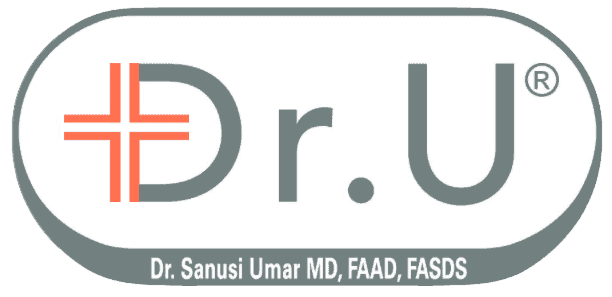Hair Transplant Using Beard Hair: Beard hair is the collection of hair that grows on the chin and cheeks of the face. Follicular Unit Extraction (FUE) surgery has seen many facial and body hair extraction advancements in the past decade. Dr. U has played a vital role in developing new methods and equipment that have increased the effectiveness and possibilities of hair transplantation surgeries, including increasing the donor hair reserve. With his invention of the Dr.UGraft system, beard hair to the head, also called facial hair to head transplant, has become a viable option for many patients suffering from severe baldness.
Hair transplant using beard hair can provide the patient with a quality source that can be utilized for beard and scalp hair restoration. Extracting hair from the facial area requires surgical precision and advanced FUE technology. It is a procedure carried out similarly to body hair FUE but focuses on the facial area as its primary donor hair reserve.
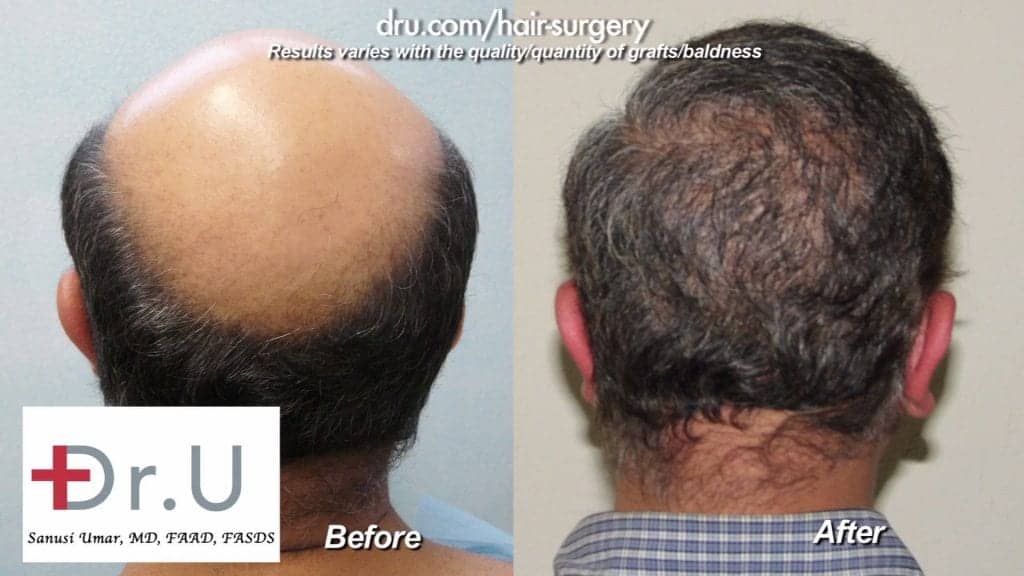
Disadvantages of Traditional FUE
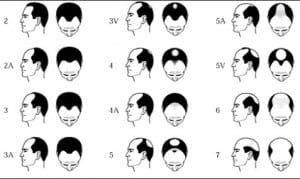
In traditional FUE procedures, once hair from the scalp [1] has been used, options for continued hair transplantation become very limited. This is typically an issue in advanced phases of hair loss, such as in patients with a 6 or 7 on the Norwood scale. Patients with severe baldness typically have thinning or short scalp hair to transplant to the bald areas. Fine hair contributes much less bulk and coverage after transplantation. Although many bald individuals have enough follicles to restore their hair for life, they usually don’t have adequate graft areas for complete hair transplantation.
Article Update August 2022
The new UGraft Zeus All-in-One FUE System is now here. It is an advanced model of the previous UGraft FUE System.
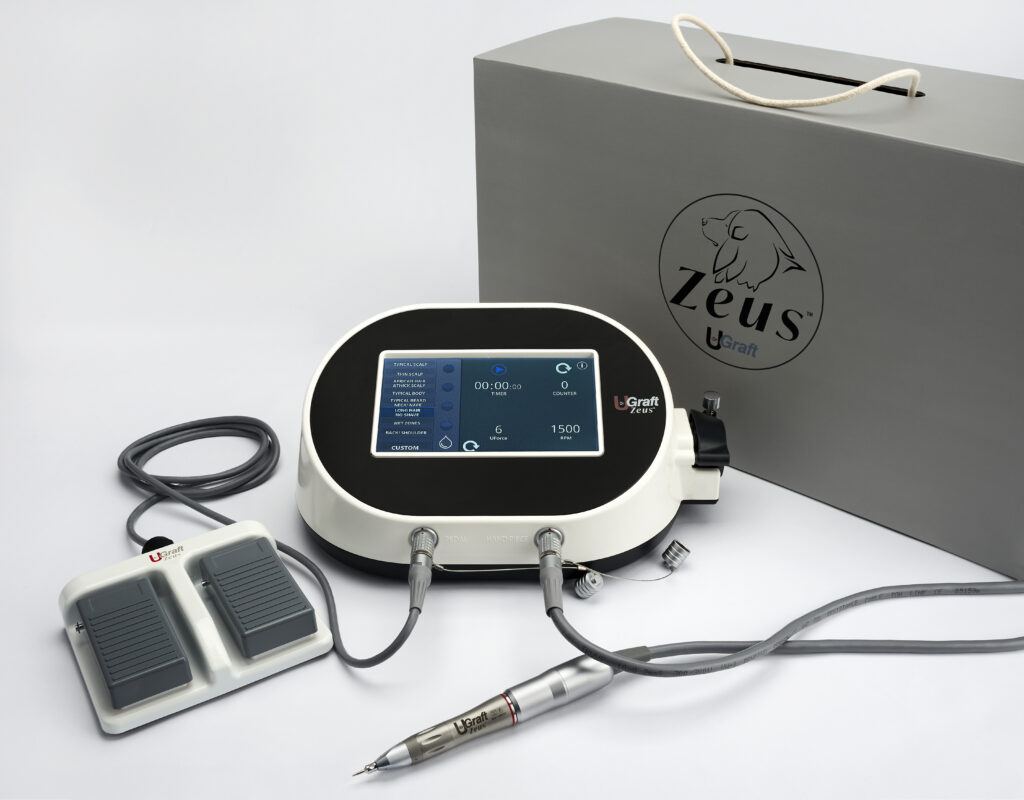
The UGraft Zeus is the first all-purpose FUE extraction device that can harvest any head or body hair, whether it be for:
- Long Hair FUE
- Body Hair Transplantation
- Scalp Hair
- Beard Hair
- Facial Hair
- Body Hair
- Chest Hair
- Nape Hair
- Leg Hair
- Pubic Hair
This revolutionary FUE system can extract all these hairs using one universal punch.
Additionally, the UGraft Zeus system is the first FUE system that can universally extract from all patients regardless of ethnicity, skin type, or hair type, opening the doors for FUE hair transplantation for everyone.
Advantages of Hair Transplant Using Beard Hair by Dr. UGraft Zeus All-in-One FUE System
This video summarizes the advantages of Dr.UGraft over traditional FUE in performing beard hair to head transplantation.
What is UGraft Advanced FUE? Results from FUE Hair Transplant
Learn more about UGraft here – http://dru.com/hair-surgery/dr-ugraft-advanced-fue-system/Sign up for a complimentary initial consultation using our online fo…
- Severe Baldness Hair restoration: Thanks to the pioneering works of Dr. Umar, A man’s face can now supply an excellent source for patients with short scalp hair or large bald areas. Fine hair provides minimal results, whereas facial hair is generally thicker. Although facial hair has fewer hair follicles per graft, the thickness of the hair shaft supplies much more volume, which is essential for patients with depleted donor areas. The beard area of a typical man supplies a surgeon with at least 3,000 harvestable grafts from under the neck and chin without a significant change to facial hair appearance. The number of hair grafts can be much higher for males who want to decrease the thickness of facial hair or eliminate their beards. Most men are willing to sacrifice facial hair for hair on their heads. Man men prefer spending less time having to shave their faces.
- Repair of Strip hair Transplant Surgery Scars and Other Scalp Surgery Scars: Dr. U published the first peer-reviewed study establishing the importance of beard hair in grafting to camouflage strip scars. In Dr. U’s experience, head and beard hair are the best hair sources to use in repairing a scalp scar. Dr. U observed that beard grafts especially do well in scars [2].
- Beard and Pubic hair Restoration: Because beard hair would naturally best mimic hairs from these areas, it would be a more natural fit for individuals seeking hair restoration in these areas where the hair is wirier

Beard To Head Hair Transplant, The UGraft Advantage
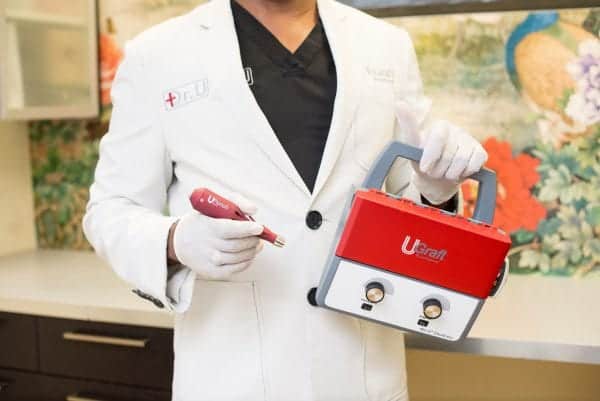
Besides being the most efficient technology for performing facial hair to head transplants, Dr.UGraft, developed by Dr. U, offers unique advantages on the wound healing front that make it the best tool for performing this procedure. As detailed in the video on top of this article and another page on this website, Dr.UPunch Rotor punches invented by Dr. U have been designed to mitigate the configuration of wounds that reduces wound eversion for better healing and scarring profiles.
The following photo sequences, also explained in animation in the video at the start of this article show serialize the concept of how Dr. UPunch’s wound configuration concept works:
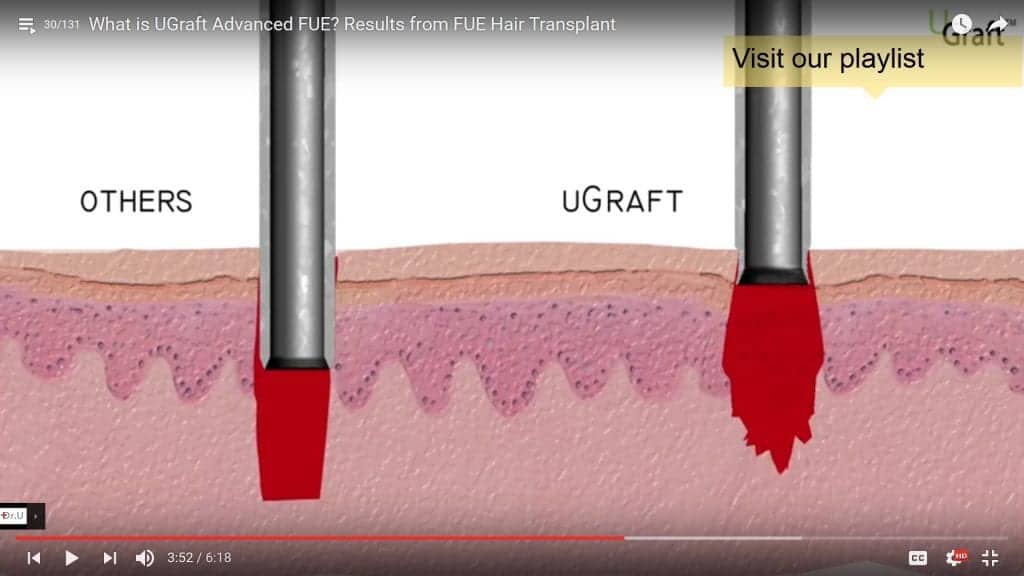
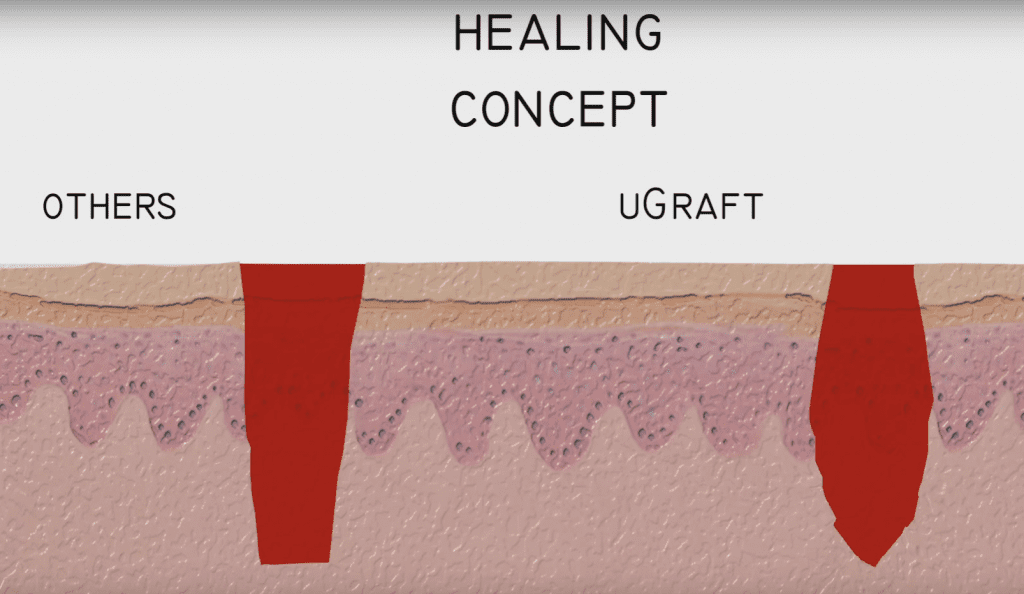
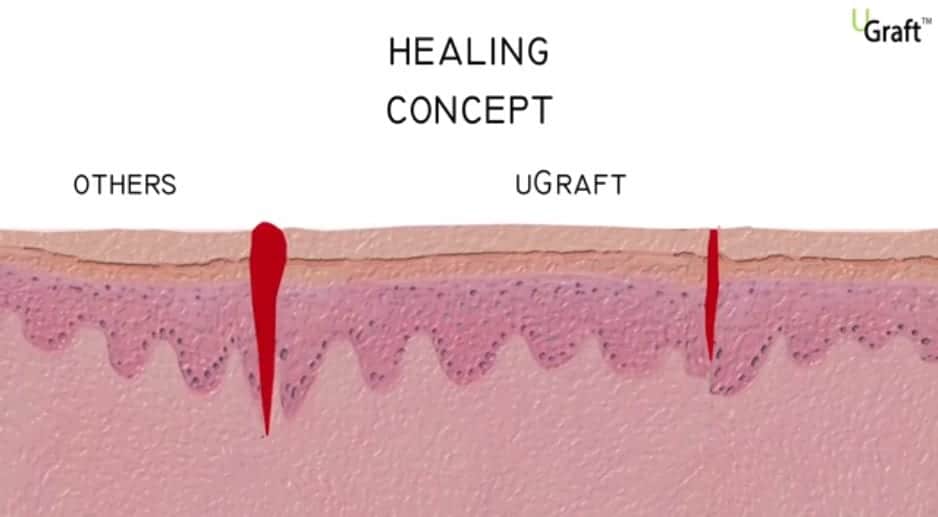
PHOTOS Of Beard Area Healing After Hair Transplant Using Beard Hair Grafts By Dr.UGraft
Video Example of Beard Area Healing After 4500 Beard Graft Extraction Using Dr.UGraft:
NW 5 Hair Restoration with BHT Body Hair Transplant – Los Angeles FUE
https://dru.com/free-consultation/Free Online Consultation (viewed within 24 hours by Dr. Umar): Dr. Umar Hair & Skin Clinic is located in Manhattan Beach, C…
What To Expect From Facial Hair To Head Surgery?
There are three significant differences between harvesting from the head/scalp and facial areas that should be considered before surgery:
- Scarring – Although there are no linear scars, facial hair to head transplants can result in minor, circular scarring. Usually, these marks are not visible in the donor area, even if the area is shaved. Dr. UGraft’s remarkable, advanced technology leads to rapid healing with minimal scarring.
- Ease of Extraction – FUE beard differs from scalp extraction due to more significant laxity or looseness of the facial skin. An advanced FUE method like Dr.UGraft is essential for successful surgeries.
- Hair Quality – Though beard hair is generally coarser and provides more volume than thinning scalp hair, it is not a direct substitute for head hair.
A patient undergoing Dr. UGraft facial hair to head transplant surgery can typically expect:
- The extraction of beard hair one follicular unit at a time using advanced tools such as the Dr.UGraft, where staples or stitches are never used.
- A quick turnaround time and barely noticeable scarring. Both donor site and recipient site healed of wounds and scabs within two weeks.
- Optimal growth of new hair should occur at about ten months but can continue to improve for up to 18 months.
Dr.UGraft Beard Hair To Head Transplant Results
Below are patient result photos and videos of successful hair transplant using beard hair by Dr. U:
After scalp reductions and hair transplants at other clinics, this patient was still bald with no more head donor hair available. He was particularly concerned about his crown, top, and front, which were thin and scarred. Dr. U used 3,000 grafts, all derived from the facial beard area.


Watch the full patient results video below:
Los Angeles FUE Hair Transplant Repair using Body hair transplant, life transformation
For more information, visiwww.dru.comTo consult Dr Umar, click: https://dru.com/free-online-consultation-hair/This patient had undergone multiple prior hair …
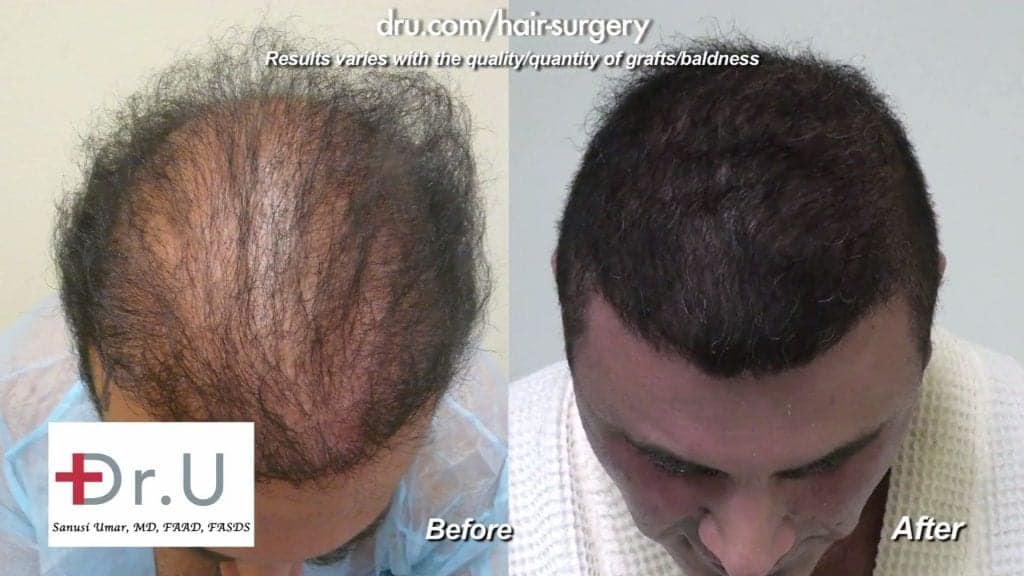
Watch the full patient results video below:
Los Angeles Strip Scar Repair Patient results using beard hair transplants
For more information visit http://www.dermhairclinic.comTo consult Dr Umar, click: http://www.dermhairclinic.com/free-online-consultation-hair-restoration-lo…
Discuss Your Hair Transplant Possibilities with Dr. U Today
For questions or concerns regarding FUE hair transplant, use the free hair consultation button to schedule a free consultation with Dr. Umar today.
Further Reading
References
- “Scalp.” Wikipedia, 24 Apr. 2022, en.wikipedia.org/wiki/Scalp. Accessed 2 Aug. 2022.
- Umar, S. “Use of Beard Hair as a Donor Source to Camouflage the Linear Scars of Follicular Unit Hair Transplant.” Journal of Plastic, Reconstructive & Aesthetic Surgery, vol. 65, no. 9, 1 Sept. 2012, pp. 1279–1280, www.jprasurg.com/article/S1748-6815(12)00230-6/fulltext, 10.1016/j.bjps.2012.04.027. Accessed 2 Aug. 2022.
